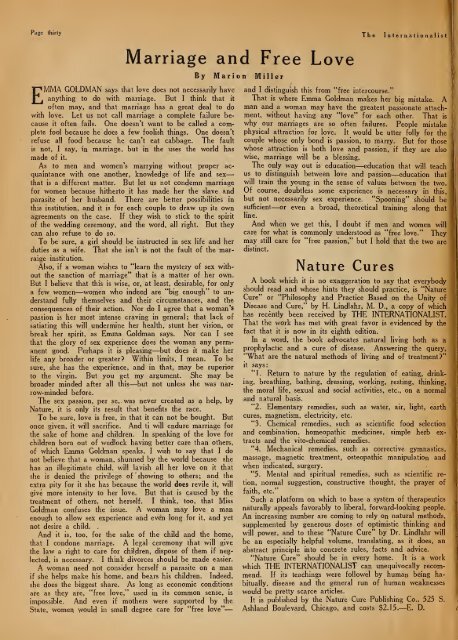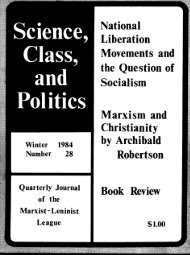Volume 6, No. 2, June, 1918
Volume 6, No. 2, June, 1918
Volume 6, No. 2, June, 1918
You also want an ePaper? Increase the reach of your titles
YUMPU automatically turns print PDFs into web optimized ePapers that Google loves.
was<br />
Page thirty<br />
The Internationalist<br />
EMMA<br />
Marriage and Free Love<br />
GOLDMAN says that love does not necessarily have<br />
anything to do with marriage. But I think that it<br />
often may, and that marriage has a great deal to do<br />
with love. Let us not call marriage a complete failure because<br />
it often fails. One doesn't want to be called a complete<br />
fool because he does a few foolish things. One doesn't<br />
refuse all food because he can't eat cabbage. The fault<br />
is not, I say, in marriage, but in the uses the world has<br />
made of it.<br />
As to men and women's marrying without proper acquaintance<br />
with one another, knowledge of life and sex<br />
that is a different matter. But let us not condemn marriage<br />
for women because hitherto it has made her the slave and<br />
parasite of her husband. There are better possibilities in<br />
this institution, and it is for each couple to draw up its own<br />
agreements on the case. If they wish to stick to the spirit<br />
of the wedding ceremony, and the word, all right. But they<br />
can also refuse to do so.<br />
To be sure, a girl should be instructed in sex life and her<br />
duties as a wife. That she isn't is not the fault of the marraige<br />
institution.<br />
Also, if a woman wishes to "learn the mystery of sex without<br />
the sanction of marriage" that is a matter of her own.<br />
But I believe that this is wise, or, at least, desirable, for only<br />
a few women—women who indeed are "big enough" to understand<br />
fully themselves and their circumstances, and the<br />
consequences of their action. <strong>No</strong>r do I agree that a woman's<br />
passion is her most intense craving in general; that lack of<br />
satiating this will undermine her health, stunt her vision, or<br />
break her spirit, as Emma Goldman says. <strong>No</strong>r can I see<br />
that the glory of sex experience does the woman any permanent<br />
good. Perhaps it is pleasing—but does it make her<br />
life any broader or greater? Within limits, I mean. To be<br />
sure, she has the experience, and in that, may be superior<br />
to the virgin. But you get my argument. She may be<br />
broader minded after all this—but not unless she was narrow-minded<br />
before.<br />
The sex passion, per se, . never created as a help, by<br />
Nature, it is only its result that benefits the race.<br />
To be sure, love is free, in that it can not be bought. But<br />
once given, it will sacrifice. And ti will endure marriage for<br />
the sake of home and children. In speaking of the love for<br />
children born out of wedlock having better care than others,<br />
of which Emma Goldman speaks, I wish to say that I do<br />
not believe that a woman, shunned by the world because she<br />
has an illegitimate child, will lavish all her love on it that<br />
she is denied the privilege of showing to others; and the<br />
extra pity for it she has because the world does revile it, will<br />
give more intensity to her love. But that is caused by the<br />
treatment of others, not herself. I think, too, that Miss<br />
Goldman confuses the issue. A woman may love a man<br />
enough to allow sex experience and eve*n long for it, and yet<br />
not desire a child. .<br />
And it is, too, for the sake of the child and the home,<br />
that I condone marriage. A legal ceremony that will give<br />
the law a right to care for children, dispose of them if neglected,<br />
is necessary. I think divorces should be made easier.<br />
A woman need not consider herself a parasite on a man<br />
if she helps make his home, and bears his children. Indeed,<br />
she does the biggest share. As long as economic conditions<br />
are as they are, "free love," used in its common sense, is<br />
impossible. And even if mothers were supported by the<br />
State, women would in small degree care for "free love"—<br />
By Marion Miller<br />
and I distinguish this from "free intercourse."<br />
That is where Emma Goldman makes her big mistake. A<br />
man and a woman may have the greatest passionate attachment,<br />
without having any "love" for each other. That is<br />
why our marriages are so often failures. People mistake<br />
physical attraction for love. It would be utter folly for the<br />
couple whose only bond is passion, to marry. But for those<br />
whose attraction is both love and passion, if they are also<br />
wise, marriage will be a blessing.<br />
The only way out is education—education that will teach<br />
us to distinguish between love and passion—education that<br />
will train the young in the sense of values between the two.<br />
]<br />
Of course, doubtless some experience is necessary in this.<br />
but not necessarily sex experience. "Spooning" should be<br />
sufficient—or even a broad, theoretical training along that<br />
line.<br />
And when we get this, I doubt if men and women will<br />
care for what is commonly understood as "free love." They<br />
may still care for "free passion," but I hold that the two are<br />
distinct.<br />
Nature Cures<br />
A book which it is no exaggeration to say that everybody<br />
should read and whose hints they should practice, is "Nature<br />
Cure" or "Philosophy and Practice Based on the Unity of<br />
Disease and Cure," by H. Lindlahr, M. D., a copy of which<br />
has recently been received by THE INTERNATIONALIST.<br />
That the work has met with great favor is evidenced by the<br />
fact that it is now in its eighth edition.<br />
In a word, the book advocates natural living both as a<br />
prophylactic and a cure of disease. Answering the query,<br />
"What are the natural methods of living and of treatment?"<br />
it<br />
says:<br />
"<br />
1 . Return to nature by the regulation of eating, drinking,<br />
breathing, bathing, dressing, working, resting, thinking,<br />
the moral life, sexual and social activities, etc., on a normal<br />
and natural basis.<br />
"2. Elementary remedies, such as water, air, light, earth<br />
cures, magnetism, electricity, etc.<br />
"3. Chemical remedies, such as scientific food selection<br />
and combination, homeopathic medicines, simple herb extracts<br />
and the vito-chemical remedies.<br />
"4. Mechanical remedies, such as corrective gymnastics,<br />
massage, magnetic treatment, osteopathic manipulation and<br />
when indicated, surgery.<br />
"5. Mental and spiritual remedies, such as scientific retion,<br />
normal suggestion, constructive thought, the prayer of<br />
faith, etc."<br />
Such a platform on which to base a system of therapeutics<br />
naturally appeals favorably to liberal, forward-looking people.<br />
An increasing number are coming to rely on natural methods,<br />
supplemented by generous doses of optimistic thinking and<br />
will power, and to these "Nature Cure" by Dr. Lindlahr will<br />
be an especially helpful volume, translating, as it does, an<br />
which THE INTERNATIONALIST can<br />
abstract principle into concrete rules, facts and advice.<br />
"Nature Cure" should be in every home. It is a work<br />
unequivocally recommend.<br />
If its teachings were followel by human being habitually,<br />
disease and the general run of human weaknesses<br />
would be pretty scarce articles.<br />
It is published by the Nature Cure Publishing Co., 525 S.<br />
Ashland Boulevard, Chicago, and costs $2.15.—E. D.
















